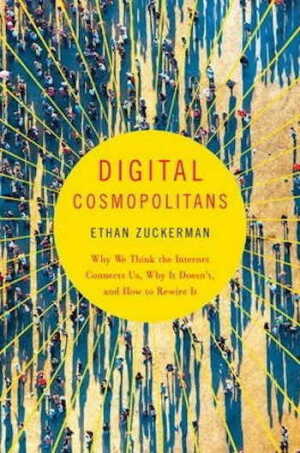Digital Cosmopolitans
Why We Think the Internet Connects Us, Why It Doesn’t, and How to Rewire It
Ethan Zuckerman
Few of us would question that the infrastructures of our globalized world are proof of the flat, Friedmanesque world in which we live. We manufacture our goods wherever we can get the best price and ship them anywhere the market demands efficiently. We can connect with any of hundreds of millions of people from pretty much every country in the world through global communication networks and social networking tools.
Once we stop looking at the infrastructure—the roads, the air routes, the shipping lanes, the cables – and start looking at the flows of traffic, it becomes very clear that some parts of the world are far more connected than others. Globalization, it turns out, is unequally distributed. We can read newspapers from Australia, India, Nigeria, Ghana, Canada, at no cost and end up with a wider view of the world. The reality is that—on average—we don’t. In fact, we get less news from international sources today than we did forty years ago. If you look carefully enough, it’s not hard to see that we live in an age of imaginary globalization.
Digital Cosmopolitans is an eye-opening reconsideration of the state of our global world, one in which it is easier to ship bottles of water from Fiji to Atlanta than it is to get news from Toronto to New York. Drawing on a wide range of contemporary research in cognitive science, psychology and sociology, it explains why a technological connection between people doesn’t inevitably lead to human connection and at the ways in which we’ve fooled ourselves into thinking that we are cosmopolitan and connected.
Having this wider picture of the world is critical for global survival. Problems like global warming, pandemic, and collective security can’t be solved by individuals or by nations acting alone—they’re global problems and they’re going to require global solutions and the most exciting opportunities—to make a difference, to make something beautiful, or to make a profit—are global in scale. We need to build solutions based on massive, transnational cooperation, which needs to begin with dialog that crosses linguistic, social, national lines.
There’s good news—we’ve got the tools we need to do this, the infrastructure that could make the world a wider place. And we’re starting to figure out what we’d need to do to build connections around the world that are real, not theoretical. Rich in examples from business, science, politics, and media, Digital Cosmopolitans explores the landscape of social, technical and policy innovations designed to more tightly connect the world and features a close look at some of the most innovative projects underway in corporate research labs and the cybercafes of developing world cities.
Published by W. W. Norton & Co.
Praise for Digital Cosmopolitans
Zuckerman’s imaginative and inventive reflections offer a resourceful guide to living a connected life with intention and insight.
— Publishers Weekly, Starred Review
